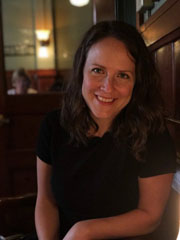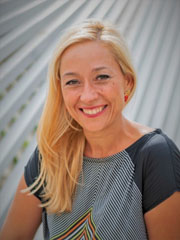Meet the problem solvers: women tackling challenges with science and technology
On the occasion of the International Day of Women and Girls in Science, meet two scientists with a passion for problem solving who have received support from the NATO Science for Peace and Security (SPS) Programme.

Stephanie Foster during the 2017 EADRCC consequence management field exercise in Tuzla, Bosnia and Herzegovina
February 11th marks the International Day of Women and Girls in Science. Mandated by the United Nations, this day sheds light on the fact that – despite some progress – women are still underrepresented in science, technology, engineering and mathematics (STEM) all over the world. The United Nations reports that in cutting-edge fields such as artificial intelligence, only one in five professionals is a woman, and that women still account for only 28 per cent of engineering graduates and 40 per cent of computer science and informatics graduates.
The NATO SPS Programme works with outstanding experts from NATO and partner countries to address security challenges through science and technology. Many of these experts are exemplary women motivated by a passion for science and for solving complex problems. This year, on the International Day of Women and Girls in Science, two scientists share their stories.
Coding for crisis response

Stephanie Foster, Technical Staff, MIT Lincoln Laboratory, US
Stephanie Foster loved problem solving from a very young age. Math was always her favourite subject - she found it both rewarding and relaxing. In college, she was introduced to computer science, which took her interest to the next level. "Coding allowed me to transform my problem-solving skills into something more tangible or real".
For over 20 years, she has been designing, implementing and deploying web-based decision-support systems. Her work improves how agencies respond to disasters; she discusses with them how technology can support them, and how it can help them protect, find or save people. "During storms, fires and other disasters, my work helps people to save those that are lost or in danger. With my software, I strive to make their job easier."
With support from the SPS Programme, she led the technical team of the Massachusetts Institute of Technology (MIT) Lincoln Laboratory that adapted and deployed the Next-Generation Incident Command System (NICS) to meet the crisis management needs of four countries: Bosnia and Herzegovina, Croatia, Montenegro and the Republic of North Macedonia. With this project, Stephanie had the opportunity to work with inspiring crisis management professionals, and to build software that unites people in the direst circumstances. From her perspective, it is important that science is accessible to everyone, as it requires a diverse set of problem solvers working together to discover the most groundbreaking solutions.
Securing information with mathematics

María Isabel González Vasco, Professor of Applied Mathematics, Universidad Carlos III de Madrid, Spain
María Isabel "Maribel" González Vasco is a Professor of Applied Mathematics and Chair of Excellence at Universidad Carlos III de Madrid. In her opinion, it is essential that the scientific community makes clear that everyone willing to work hard is welcome: "It does not make any sense to waste half of our potential workforce."
Maribel always loved solving problems and facing challenges head-on. A career in science meets those interests, and allows her to enjoy interacting with diverse people, learning and being creative. "I really enjoy the quest, the feeling of getting closer to a solution through somewhat unexpected tools, and finally realising I am reaching a correct answer to my questions."
Maribel's work in Mathematical Cryptography is right at the frontier between mathematics and computer science. She uses mathematics for a number of applications, including to find ways to guarantee that information can be shared securely. As a co-director of the SPS project "Secure Communication in the Quantum Era", she worked with colleagues in Malta, Slovakia and the United States to design a chat tool that enables the secure exchange of information, imperceptible even to adversaries using quantum computers. She led the team that – among other tasks – was able to prove the security of the system under different attack scenarios. "Science is a systematic quest for answers. It is about curiosity, thirst for knowledge and wish for improvement. These are all gender-independent appetites."
How does the Science for Peace and Security Programme help?
The SPS Programme brings together academics, experts and officials from NATO and partner countries who jointly lead research and knowledge exchange activities. Participation in these activities helps to build and expand international scientific networks without gender bias. Opportunities for cooperation are announced as calls for proposals on the SPS website. It is also possible to stay up-to-date with the latest opportunities offered by the SPS Programme by subscribing to the SPS newsletter.
